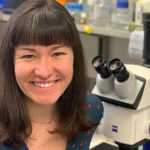2019/20 Events
Michael Smith Distinguished Research Lecture: Dr. Michael Rosen
Co-sponsored by Department of Biochemistry and Molecular Biology and the Michael Smith Laboratories. “Regulation of Cellular Biochemistry by Liquid-Liquid Phase Separation”, by Dr. Michael Rosen, Professor, Department of Biophysics, University of Texas Southwestern Medical Centre, Howard Hughes Medical Institute. Monday, March 2, 2020 at 4:00 pm, LSC#2 Host Dr. Joerg Gsponer Biomolecular condensates are two- […] Read More
Nicolas Coutin – Doctoral Exam
“Method Development for High Throughput Biology,” by Nicolas Coutin, doctoral candidate, Corey Nislow Lab. Monday, March 16, 2020 at 4:00 pm, Room 200, Graduate Student Centre, 6371 Crescent Road Read More
BMBDG Seminars – Alistair Boettiger
“Genome folding in development, ” by Alistair Boettiger, Assistant Professor, Stanford School of Medicine, Department of Developmental Biology, Member of Stanford Bio-X, Member of Stanford Biophysics, Stanford University. Establishment of different cell types during development requires precise interactions between genes and distal regulatory elements. However, our understanding of what these interactions look like in three […] Read More
Seminar Series – Dr. Ana Fiszbein
“Dynamic determinants for co-transcriptional gene regulation,” by Dr. Ana Fiszbien, Department of Biology, Massachusetts Institute of Technology. The architecture of mammalian genes enables the production of multiple transcripts that greatly expand the coding capacity of our genomes. Impacts of RNA processing on the stability of RNAs are known, but effects on transcription are less understood. […] Read More
Cancelled: Seminar Series – Dr. Bruno Di Stefano
“Dissecting mechanisms that govern cellular plasticity, ” by Dr. Bruno Di Stefano, MGH Department of Molecular Biology, Harvard Medical School. Post-transcriptional mechanisms have the potential to influence complex changes in gene expression, yet their role in regulating stem cell potency and cell fate transitions remain largely unexplored. We have recently identified the RNA processing protein […] Read More
Seminar Series – Dr. Chad W. Johnson
“Evolved Molecules: Discovery and Directed Evolution of Nature’s Antibiotic Arsenal,” by Dr. Chad W. Johnson, Department of Biological Engineering, Massachusetts Institute of Technology. Antibiotics are essential components of modern medicine, but the overuse of broad-spectrum drugs and the emergence of drug-resistant pathogens have led to a looming crisis for global healthcare. Nearly all of our […] Read More
Seminar Series – Dr. Monica C. Pillon
“Cryo-EM reveals active site coordination within a multienzyme pre-rRNA processing complex,” by Dr. Monica C. Pillon, Signal Transduction Laboratory, National Institute of Environmental Health Sciences, NIH Ribosome assembly is a complex process reliant on the coordination of trans-acting enzymes to produce functional ribosomal subunits and secure the translational capacity of the cell. Las1 is a […] Read More
Seminar Series – Dr. Lauren N. Booth
“Sexual Interactions Induce Early Death in Nematodes: Strategies and Counterstrategies,” by Dr. Lauren N. Booth, Department of Genetics, Stanford. Sexual interactions can dramatically influence health, but the molecular mechanism is poorly understood because the sexes are typically kept separate in biomedical research. In C. elegans and its relatives, interactions between the sexes negatively impact health. […] Read More
Seminar Series – Dr. Ethan J. Greenblatt
“Insights into reproductive and neural disorders form developmentally quiescent oocytes,” by Dr. Ethan J. Greenblatt, Department of Embryology, Carnegie Institution for Science. Abstract: Human primordial follicles are capable of surviving a period of developmental arrest lasting for up to 4-5 decades; however, they develop with high levels of aneuploidy, leading to an estimated miscarriage rate […] Read More
BMBDG Seminar – Mathew Macauley
“Development of Biochemical Approaches to Study Siglec-Glycan Interactions”, by Mathew Macauley, Assistant Professor, Department of Chemistry, University of Alberta. Siglecs are a family of carbohydrate (glycan) binding proteins expressed on white blood cells that have immunomodulatory properties. Siglec-glycan interactions help maintain immune homeostasis and dysregulation of Siglec-glycan interactions have recently been implicated in cancer, neurodegeneration, […] Read More









